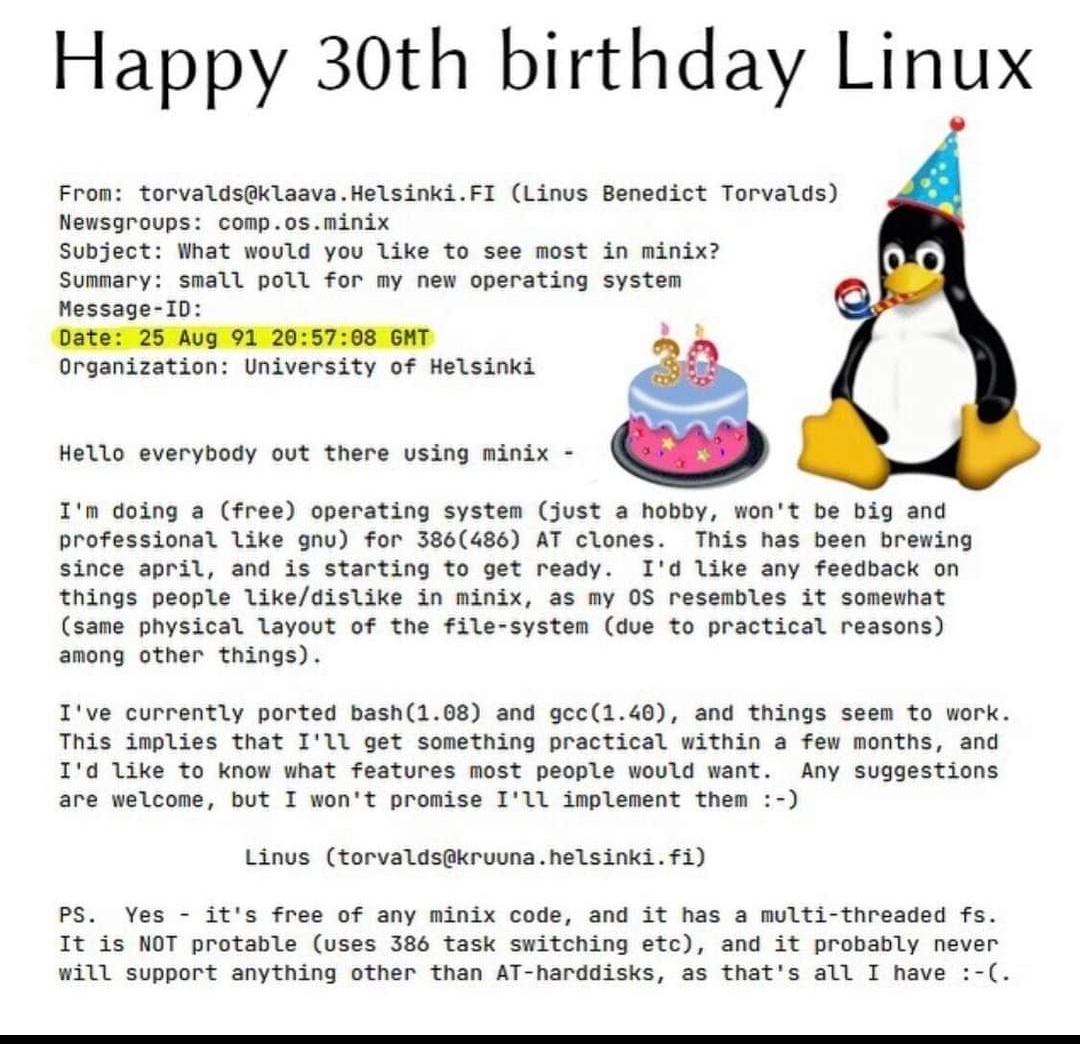August 25th, 1991
That’s right, it’s been 30 years since 21-year-old Finnish student Linus Benedict Torvalds made his now-famous announcement on the day of August 25th, 1991, on the comp.os.minix news group, saying that he is working on a free operating system for 386(486) AT clones as a “hobby.”


65 Comments
Tomi Engdahl says:
Wow! Torvalds Modified Fedora Linux to Run on his Apple M2 Macbook
Ankush Das
Ankush Das
Sep 15, 2022
3 min
Linus Torvalds made Fedora Linux Workstation 36 work with Apple Macbook Air M2. Nice!
https://news.itsfoss.com/fedora-apple-torvalds/
Tomi Engdahl says:
https://mobile.twitter.com/FieldExplores/status/1577064136219176960
Tomi Engdahl says:
Heads up: Intel Laptop Users Should Avoid Linux kernel v5.19.12 to Avoid Damaging the Display
https://lore.kernel.org/all/YzwooNdMECzuI5+h@intel.com/
Tomi Engdahl says:
https://www.phoronix.com/news/SELinux-Runtime-Disabling
Tomi Engdahl says:
Linus Torvalds to kernel devs: Grow up and stop pulling all-nighters just before deadline
Release candidate one for Linux 6.1 has appeared
https://www.theregister.com/2022/10/17/linux_6_1_rc1/
Tomi Engdahl says:
The Linux Kernel May Finally Phase Out Intel i486 CPU Support
https://www.phoronix.com/news/Intel-i486-Linux-Possible-Drop
Linus Torvalds has backed the idea of possibly removing Intel 486 (i486) processor support from the Linux kernel.
After the Linux kernel dropped i386 support a decade ago, i486 has been the minimum x86 processor support for the mainline Linux kernel. This latest attempt to kill off i486 support ultimately arose from Linus Torvalds himself with expressing the idea of possible requiring x86 32-bit CPUs with “cmpxchg8b” support, which would mean Pentium CPUs and later
Tomi Engdahl says:
Laugh all you want. There will be a year of the Linux desktop
But, it won’t play out the way you think it will
https://www.theregister.com/2022/10/14/year_of_linux_desktop/
It has become a running joke. “20xx will be the year of the Linux desktop.” The punchline is, of course, it will never happen. But the real jape is that there will soon be a year of the Linux desktop. It’s just not going to happen the way Linux fanboi have believed it will.
The Linux desktop dream has been that companies and people will realize that the Linux desktop is simply better than Windows. Part of the hope is true. The Linux desktop is better than Windows.
Really. For starters, the Linux desktop is far more secure than Windows. I mean, sure, Linux has security problems. What doesn’t? But Microsoft has a monthly security mea culpa day: Patch Tuesday.
Tomi Engdahl says:
Red Hat Enterprise Linux 9: Security baked in
The newest RHEL moves beyond servers and the datacenter to the edge and multicloud.
https://www.zdnet.com/article/red-hat-enterprise-linux-9-security-baked-in/
RHEL 9 Customers want better security, and Red Hat will deliver it. Beyond the usual RHEL hardening, testing, and vulnerability scanning, RHEL 9 incorporates features that help address hardware-level security vulnerabilities like Spectre and Meltdown. This includes capabilities to help user-space processes create memory areas that are inaccessible to potentially malicious code. The platform provides readiness for customer security requirements as well, supporting PCI-DSS, HIPAA, and more.
Specific security features:
Smart Card authentication: Users can make use of smart card authentication to access remote hosts through the RHEL web console (Sudo, SSH, etc.).
Additional security profiles: You can improve your security intelligence gathering and remediation services such as Red Hat Insights and Red Hat Satellite with security standards such as PCI-DSS and HIPAA.
Detailed SSSD logging: SSSD, the enterprise single-sign-on framework, now includes more details for event logging. This includes time to complete tasks, errors, authentication flow, and more. New search capabilities also enable you to analyze performance and configuration issues.
Integrated OpenSSL 3: It supports the new OpenSSL 3 cryptographic frameworks. RHEL’s built-in utilities have been recompiled to utilize OpenSSL 3.
SSH root password login disabled by default: Yes, I know you ssh into your server with root passwords all the time. But it’s never been a smart idea. By default, RHEL won’t let you do this. Yes, this is annoying, but it’s even more annoying to hackers trying to log in as `root` using brute force password attacks. All-in-all, this is a win in my book.
In this release, Red Hat also introduces Integrity Measurement Architecture (IMA) digital hashes and signatures. With IMA, users can verify the integrity of the operating system with digital signatures and hashes. With this, you can detect rogue infrastructure modifications, so you can stop system compromises in their tracks.
AlmaLinux 9 Now Available!
https://almalinux.org/blog/almalinux-9-now-available/
Hello Community! The AlmaLinux OS Foundation is proud to announce general availability of AlmaLinux OS 9.0. AlmaLinux 9 supports the following 4 architectures providing full parity with upstream:
Intel/AMD (x86_64)
ARM64 (aarch64)
IBM PowerPC (ppc64le)
IBM Z (s390x)
Tomi Engdahl says:
https://hackaday.com/2022/11/02/bye-bye-linux-on-the-486-will-we-miss-you/
Tomi Engdahl says:
Unix vs Linux: The history of how Unix started and influenced Linux
Many of the commands in 1972′s Unix 2nd edition are still used in today’s Linux. Learn how Unix started and how it’s changed over time.
https://www.redhat.com/sysadmin/unix-linux-history
Tomi Engdahl says:
https://hackaday.com/2023/08/21/looking-back-on-30-years-of-debian/
Tomi Engdahl says:
https://etn.fi/index.php/13-news/15180-vain-kolme-sadasta-kaeyttaeae-linuxia
Tomi Engdahl says:
The Land Before Linux: Let’s talk about the Unix desktops
It takes more than open source, it takes open standards and consensus
https://www.theregister.com/2024/01/27/opinion_column/
Tomi Engdahl says:
On this day in 1992, marked a watershed moment in computing history when Linus Torvalds released version 0.12 of the Linux kernel. This release introduced the GNU General Public License, paving the way for widespread adoption and collaboration.
Today, Linux powers billions of devices worldwide, from supercomputers to Android smartphones, cementing its legacy as a technological cornerstone.
Linux was my red pill into the world of software development; its open-source nature ignited a curiosity that fueled countless hours of exploration, ultimately shaping my passion for code.
https://www.facebook.com/share/p/dVGnX5kxTofphc3K/
Tomi Engdahl says:
https://en.m.wikipedia.org/wiki/History_of_Linux